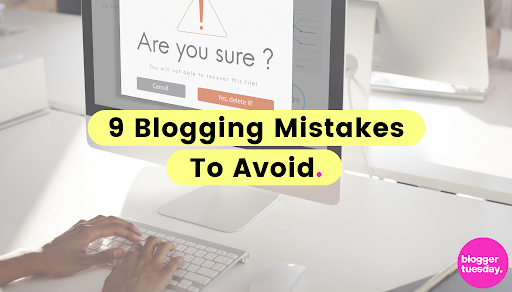Blogging can be tricky, with numerous blogging mistakes waiting to trip you up. It’s easy to think you’re on the right track, only to discover that you’re not as informed as you thought.
Fortunately, these blogging mistakes can be avoidable. By understanding these common pitfalls, you can set your blog on the path to success right from the beginning.
Curious about what these crucial blogging mistakes are? Let’s delve into the nine most common errors and how you can sidestep them for a more effective blog.
#1. Accepting too many sponsored, gifted, and paid reviews
Top of the list of blogger mistakes to avoid is accepting too many sponsored, gifted, or paid reviews. While these are nice from time to time, audiences can become suspicious if you include them too often.
Ideally, your blog should provide readers with value. Site visitors should feel like they are getting unbiased information from a seasoned and authoritative expert.
But if you keep adding sponsored or paid reviews, it can feel like you’re selling out. Your audience starts viewing you as a sleazy salesperson, not the upstanding, trustworthy online figure you aspire to be.
Worse still, selling third-party products feels less personal. It’s like you’re talking on behalf of your corporate sponsors instead of meeting the needs of your audience – a real bummer for anyone reading your blog.
The fix is simple: stop writing paid or gifted reviews as much. Focus more on building your unique, non-commercial content.
#2. Using an unprofessional email or blog name
Another error is using an unprofessional email or blog name that looks like it came from 2009. Calling your blog things like “Diary of a Wimpy Blogger” or “I can’t believe I wrote this blog” might have been fun in years past, but we’re more than 30 years into the blogging revolution, and the novelty is wearing off.
To avoid this mistake, give your blog a professional, modern-sounding name. Here are some examples:
- Offbeat Dirt Track Adventures
- Designs From Divas
- Digital Vision
- Stylish Savant
- Your Personal Growth Guru
Obviously, yours will be better!
#3. Covering too many topics
Bloggers also get into trouble when they cover too many topics. Like the classic adage says, trying to make everyone happy pleases no one.
Given the sheer number of blogs on the internet, the days of generalist bloggers are over. Most readers will only frequent your site if they can get niche content. If you become an expert in everything, readers may doubt your expertise and simply go to blogs that provide more useful, researched and in-depth content.
Covering too many topics also makes marketing your blog a nightmare. Outreach becomes exponentially more challenging because you can’t anchor it around a single idea or concept. What connects travel and DIY? Nothing!
Our advice is simple: stick to the same group of topics. Only branch out if your audience wants you to.
#3. Trying to manage everything yourself
Trying to manage everything yourself is another huge mistake, especially as your blog grows. You can easily end up working around the clock if you don’t plan for scalability.
Issues managing everything on your own include:
- Declining blog quality
- Burnout and mental health problems
- Trouble dedicating enough time to stay up-to-date and informed
- An increase in errors and missed opportunities
- Lower productivity
- Less time available for content creation
Fortunately, there are plenty of ways you can solve these problems. One idea is to shift tasks and responsibilities over to others. For example, hiring IT professionals can help manage your website’s backend. Likewise, automation tools can assist with time-consuming tasks like scheduling posts, analysing data, and managing comments.
You can also invest in blogging communities and partnerships. Learning from other bloggers and experts can provide insights, support, and collaboration opportunities that enable you to work more efficiently as you scale.
#5. Getting obsessed with metrics
Bloggers also get into trouble when they become obsessed with metrics. Statistics, like reach and engagement, are consequential, but they are not the be-all-and-end-all of blogging success.
One problem with focusing solely on metrics is that it can distort the content creation process. Focusing on statistics only could lead you to prioritise clickbait titles and sensational headlines that fail to build your authority. Engagement may spike initially and then sink like a stone.
Metric obsession can also divert you from your original purpose. Fiddling around and trying to get maximum clicks releases a giant dopamine hit, but it does little to convince audiences they should take you seriously. Flip-flopping on your aims, objectives, and values just puts them off.
Ignoring actual engagement is another problem. That’s because metrics only show you your blog’s digital footprint; they don’t tell you the personal impact on users. Obsessing over vanity metrics can detract from the value creation you need to develop a loyal audience.
#6. Not using social media alongside blogging
Failing to use social media alongside blogging is another significant mistake. While operating outside established platforms gives you more freedom, Facebook, Instagram, TikTok and X are still essential for success.
You can probably guess why this is the case: these platforms are fantastic sales funnels. The content you post on them serves as a conduit, sending users to your blog where they can consume the meatiest articles and posts.
The risks of not using social media alongside blogging are substantial. If you don’t do it, you could have:
- Limited reach and visibility
- A smaller (or non-existent) following
- Restricted brand recognition and building
- Reduced SEO performance
You could also miss valuable opportunities to work with collaborators and form partnerships. Abstaining from social media prevents you from building a robust network and gaining the connections you need to reach new audiences.
#7. Not using scheduling software
You can also get into trouble as a blogger by refusing to use scheduling software. Not leveraging the latest tools can lead to reduced productivity, problems constantly posting content, and limited A/B testing. It can also increase your workflow and prevent you from scaling your blog successfully – not what you want.
Fortunately, you don’t have to look far to find blogger scheduling solutions. There are literally dozens on the market.
Good examples include:
- Trello – a full-scale project management tool that helps you organise, plan, and schedule blog posts. See your workflow and what you need to do next.
- Buffer – a social media scheduling tool that lets you post content to social media automatically, according to a timetable you set
- Loomly – a tool offering streamlined post creation, calendar workflow visualisations, and community management tools designed specifically for individual bloggers.
- Onlypult – An efficient content-creation engine that assists with posting to various social media sites. Create multiple posts and post them automatically to diverse channels.
Finding content scheduling solutions that post automatically on your site is also possible, but it depends on the platform you use. WordPress has plenty of plugins that’ll do the job, but others might not.
#8. Keeping your readers out of the loop
Bloggers also make a mistake when they keep their readers out of the loop, particularly if they run a more personal blog. Failing to explain absences from content creation can create a negative impression.
The reason for this is simple to understand: readers hate a lack of transparency. When bloggers take off, it can arouse their suspicions or make them feel like they are in the dark.
Of course, you have a right to privacy. You don’t need to tell your audience what you are actually doing. However, letting them know you’ll be taking a break to “go on vacation” or “work on a project” is often all that’s needed to keep them happy. As long as they have a story, you should be fine.
Telling your readers why you are taking time off can also help prevent rumour-mongering or misinformation. When there is a news vacuum, your audience will fill it with their own theories, almost all of which will be utter bunk!
#9. Giving up too early!
Finally, many bloggers make the mistake of giving up too early. Building a blog takes time!
Professionals estimate that creating a killer blog requires two to four years of consistent effort. Therefore, don’t give up after six months if you aren’t getting the results you want. You need to milk the algorithm for a while before it starts giving you the goodies.
If you feel yourself wanting to give up, take action. Don’t slowly fade away, as so many budding content creators do.
Start by believing in what you are doing. Trust that there is value in it. If you find it helpful or interesting, somebody else will, too. Find ways to get into a flow state. Enjoy the creative process for what it is: pure fun. Don’t turn it into a chore.
Wrapping Up
Making common blogging mistakes as a blogger is part of the experience, so don’t worry if any of these blunders apply to you. Just work on eliminating them one by one until you get on top of them.
Remember, the main goal is to provide your audience with value. If you do that consistently, you can’t go wrong.


